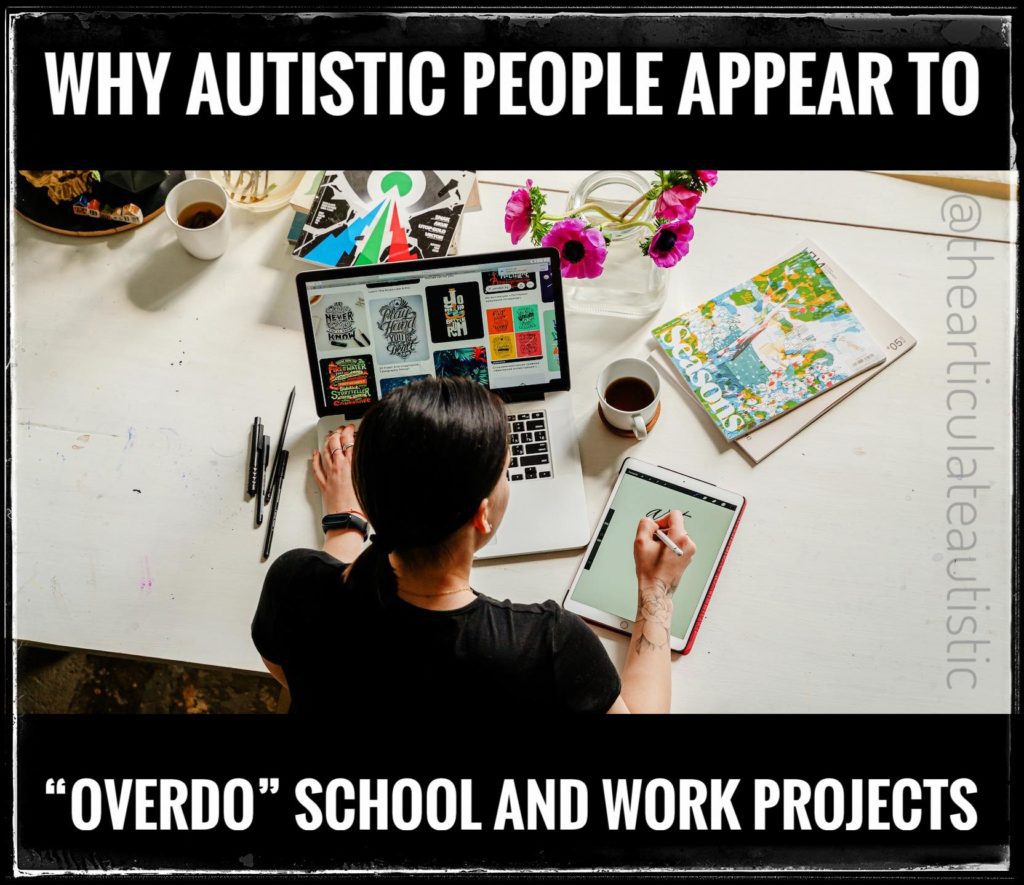Why Autistic People Appear to “Overdo” School and Work Projects

I often say that I don’t half-ass anything, I do it with my whole ass or not at all. Even though the saying is tongue-in-cheek, the sentiment, for me, is not. I either do something thoroughly or not at all. It’s just how I am as an autistic/ADHD person.
Unfortunately, like many of my autistic/ADHD traits, this tendency to “overdo” (or, from my perspective just ‘do’) projects has caused people to get an inaccurate picture of who I am as a person.
Babysitting the Flour Sack Child
I’ll give you an example of how I take instructions literally and put everything I am into a project. The first time I remember this being an issue was when I was 17 in my high school home economics class. We were all given a bag of flour to carry around and ‘care’ for as though it was our child.
I went one better and put my flour sack into the pajamas of an old baby doll because it made everything seem more real and tangible to me. The teacher didn’t seem to mind that part, and even the other kids thought it was OK.
I was very serious about my flour sack child. I carried it everywhere with me, was gentle and careful with it, and I filled out my ‘care form’ with great detail as I imagined feedings, diaper changes, bathing, etc.
When I had plans to go out one night, I took my flour sack child over to my friend’s house to babysit (which our teacher had told us to do).
At the end of the assignment, I turned in my flour sack, undamaged, along with all of my notes. The teacher pulled me aside after class and asked me why I had done all that. I blinked uncomprehendingly. She explained that most kids just put the flour sack in their locker for a week and forgot about it, fudging the care sheet the day the assignment was due. I gaped at her, my brain trying desperately to make sense of the meaning of her words.
Wait. Was a teacher telling me that I should have done less work? That I should have ignored the details of the assignment and instead done what the other kids did? Was that what was expected of me?
Surely not. No. Couldn’t be. Could it? What?
She didn’t understand what I didn’t understand, and I walked away stunned, confused, and a bit hurt. I think she was trying to tell me to ‘lighten up’ and not take my work so seriously, especially as a senior, but I really didn’t get it.
It was at that moment that I first encountered this vague feeling that doing the right thing was somehow wrong in a fundamental yet complex way that would continue to elude me for over a decade to come.
Autistic People Are Not Kissing Butt OR Slacking Off
When I got into the working world, things didn’t get any better. According to my supervisors and co-workers, I was either doing way too much or I was purposefully slacking off, and they treated me accordingly depending on which incorrect version of me they were perceiving that day.
The truth is, I was always thorough and appeared to be “doing too much” when I understood the assignment, especially if it was something I was interested in. I did these projects all the way because I had no idea there even was an alternative to giving 100%.
During those times, I was seen favorably by my bosses, but my co-workers apparently thought I was “kissing butt” (trying to look good in my supervisor’s eyes so I would get praise, a promotion, a raise, etc.), so they gave me the cold shoulder, dirty looks, or they’d get short with me during conversations.
Of course, I had no idea what was going on at the time or why their behavior towards me changed so suddenly.

When I appeared to be slacking off, however, it was because, as part of being autistic/ADHD, I need to be explicitly told when something needs doing, or I don’t see to do it. Unfortunately, this made people think I was willfully ignoring their unspoken expectations–even though I didn’t know they existed!
This seemed to tick off my supervisors, but it caused mixed reactions from my co-workers. Either they appreciated that I was supposedly phoning it in, so to speak, because it made them look good, or they got irritated with me because my lack of awareness held up their ability to do their part of the job.
Again, I had no idea what was going on or why their behavior towards me was constantly changing. It was always a mystery to me, and it made psychological safety in any job an impossibility.
A Note to Teachers and Supervisors
Your autistic employees or students are not trying to curry favor when they put 100% of their effort into projects. They wouldn’t even think to do anything less, but there’s no hidden agenda behind it. It’s just how many of us are. The same goes for students or workers who appear to not be pulling their weight. It has nothing to do with being lazy or not caring. Oftentimes, they just don’t know what’s expected of them unless those expectations are clearly laid out.
The good news is, the solution to these two perceived extremes is the same: Be clear and concise in your instructions. Tell your autistic student or worker exactly what you expect, exactly what you need, and exactly how much effort you need them to put in. Don’t leave anything out–the more detail the better, and give clear deadlines!
The Takeaway
As a neurotypical person, you may read social intent where there is none when working with or teaching an autistic person. Reacting to these perceptions without understanding the true intentions behind them can cause confusion and trauma. If you’re ever feeling unsure, ask the autistic person directly. It’s almost always the best practice when communicating with us, anyway!
Download a PDF of this article on Patreon by clicking here.




Thanks so much for articulating what many of us are feeling! This describes me perfectly. If I do something I will put everything into it. If I don’t do something I should, there is always a reason. Usually it is because I am confused or don’t know where to start.
You’re welcome. 🙂 Thank you for commenting.
I am reading this as I look at returning to workforce at 57 yrs old – I want my freedom from a cruel emotionally abusive man I have lived with for 11 yrs- 9 yrs married.
I am not able to get him to understand how painful his rampages are to my mental health.
He thinks I am trying to control, manipulate, etc him. I just tried to be close to him n he hates everything about me. His cruel words even include my birth mother who I didn’t even meet until 2010. He tells me every one hates me, I am a piece of sh—, whore etc. he has lied to police and sent me to jail once. He still threatens to send me to jail.
It’s gotta end I am too old n it makes my head hurt so much when he yells at me for hours.
I’m so, so sorry this is happening to you! I hope you find a safe escape and peace in your life. <3
Hi so I’ve been looking at these articles for a little bit, and I’m just wondering if these attributes you talk about in all of your articles from ABA trauma to how to better understand what NT’s are talking about, also apply to ADHD or if I should be looking at other possible neurodivergence’s?
Some of it can apply to ADHD, but if you feel you resonate with a lot of posts about being autistic, I would research into that further.